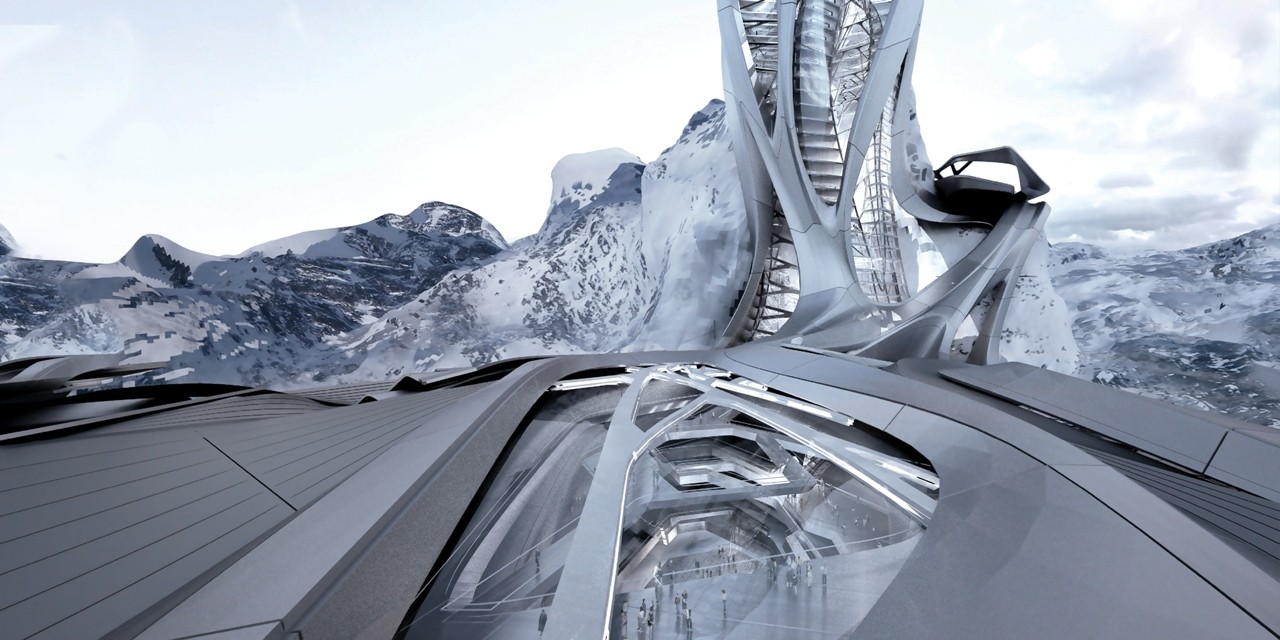
Antarctic icebergs morph into a sprawling multi-functional hub for research, transport and accommodation in one of the latest projects to come out of Zaha Hadid's Studio at the University of Applied Arts in Vienna. Designed by architecture student Sergiu-Radu Pop, the project hypothesizes a point of arrival for the world's final frontier of development. The project employs biomimicry as a primary design tool, replicating the jagged asymmetrical edges of ice formations along the coast of the southern ocean.
Enter the Transformable Antarctic Research Facility with more photos and info after the break

The facility is unmistakably influenced by Hadid's soaring structures, recalling her previous nautical work on super yachts. The building snakes out of the water, ascending the face of the ice-covered continent and soars skyward with a tower clad in glass. Giant white steel webs weave above the open decks of the public facility, harmonizing with the rough Antarctic terrain. The asymmetry of the building echoes the landscape while remaining distinctly man-made in its incorporation of commercial elements for use by the public and researchers alike.

The structure has two distinct programs: quiet pensive spaces devoted to Antarctic research, and vast open public spaces devoted to the expanding sector of environmental tourism. The building is nestled into the rugged coastline, providing ample opportunities for effective research, while simultaneously offering a natural connection to guests. The ambitious program for the building includes temporary and permanent accommodation, public exhibition space, leisure and exercise spaces, conference halls, observation decks, docking stations for additional boats, and helipads and runways.

Design for the Transformable Antarctic Research Facility incorporates a horizontal component over water with an additional tower built into the uneven coastal ice of Antarctica. The two components are designed to maximize the opportunities for construction on the icy continent while accounting for the unpredictable weather conditions of the southern pole. Mutability is key in the dynamic facility due to the experimental nature of its location - the building is capable of withstanding changes to its frozen foundation while continuing its normal function.

Project designer Sergiu-Radu Pop placed a major emphasis on the improvement of research facilities which traditionally offer a compromise on quality of life for researchers in favour of more work space. Pop argues the research is hindered by inadequate personal space for researchers, and instead designed a multi-functional hub and micro-community for research to take place amongst a host of vibrant activities. Pop combined research with experimental tourism to provide an unparalleled experience where the public can explore the landscape as scientists, contributing to the dialogue on Antarctic research.

The student project was created at Studio Hadid Vienna, Zaha Hadid's teaching studio at the Institute of Architecture, University of Applied Arts Vienna. The project belongs to Hadid's larger interest in Antarctic development as exhibited at this year's Venice Biennale. Find out more about Studio Hadid Vienna on their website.

Architects
Studio Hadid Vienna and Sergiu-Radu PopLocation
AntarcticaProject Author
Sergiu-Radu PopProject Year
2014Photographs
Courtesy of Sergiu-Radu PopLocation
AntarcticaProject Year
2014Photographs
Courtesy of Sergiu-Radu Pop


















